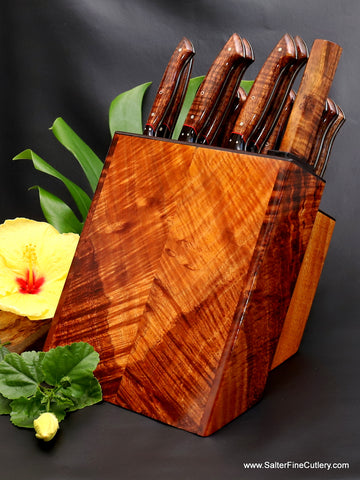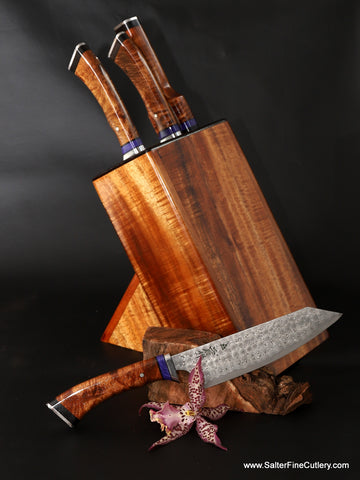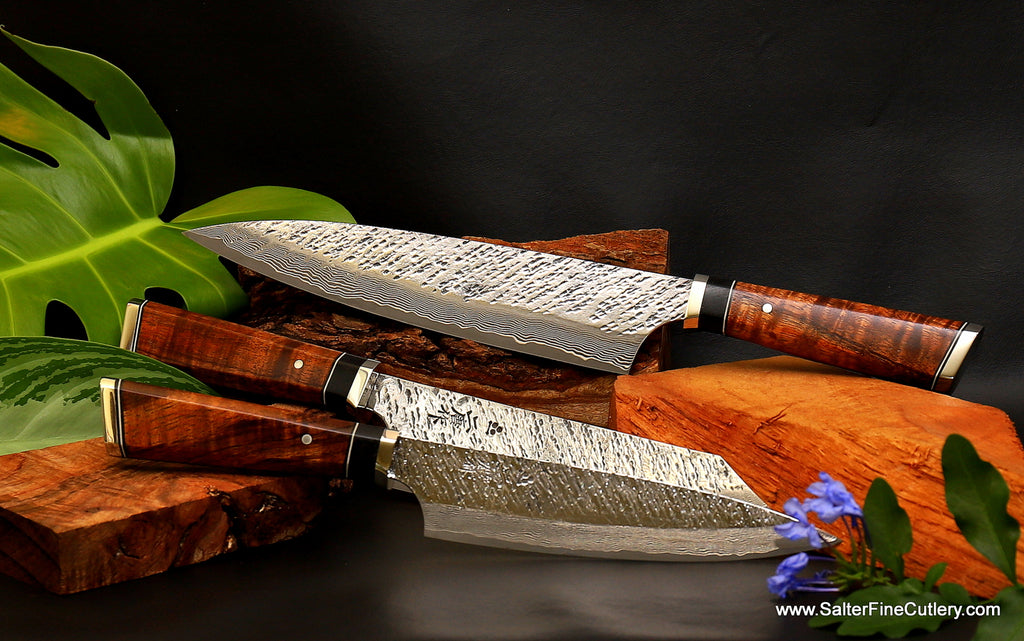In part 1 of this post, we discussed not only the fact that your custom chef knife set can be made to compliment your own cooking needs, but also your kitchen decor. We also discussed the basic difference in using a fine hand-forged Japanese knife than what you may have been previously using.
In this post, we will answer a few more common questions about owning and using hand-forged high-quality luxury knives.

Q: What do I need to know about washing my knives?
Washing:
Like any high-quality knife, they should never be washed in an automatic dishwasher. The heat and detergents used in automatic dishwashers will damage your knife handle and possibly your knife blade. That being said, clean-up is easy. I know, I use my Salter Fine Cutlery knives every night, and cook from scratch on average of 350 nights a year.
It literally only takes a minute or two to care for my knife and keep it looking good for years and years.
Simply apply a little of your favorite dishwashing liquid detergent to a nylon soap brush or wash cloth, wash your blade, then rinse in warm water tip pointing downward. Rinse the handle or wipe with soap and rinse; it's fine. The handles are also meant to be washed.

Q: OK, I can wash them by hand, but is there anything else important about washing by hand?
Yes. Most importantly, wash separately.
Never toss your knives in a sink full of other utensils or together with pots and pans. Wash separately means set your knife aside and do not soak or wash along with any other items. Why?
'A material can only be damaged when in contact with another material of equal or greater hardness' is a good way to think about this.
Stainless steel is hard, but so is another stainless steel knife or other cooking utensils. When steel meets steel, you can expect possible scratching or even chipping of the blade edge. This is because your Japanese blade is ground to a very fine and thin edge compared to most production knives and certainly compared to European style knives. And your Salter handle is made from wood. Any steel object is harder than wood, therefore knives rattling around in a sinkload of knives, forks, spoons and other utensils will most certainly cause damage, if not the first or second time, but eventually, to your handles as well as your blades.
Your knife will last a lifetime and more, but only if treated well and with the love that went into its production.

Q: What about rust?
Unless you have specifically ordered one of our carbon steel shirogami or aogami knives, your knife will be made from the highest quality stainless cutlery steels made in Japan, which is world renowned for superb cutlery steel.
However, even the best stainless steels can discolor or even develop rust spots if not towel dried. Leaving your knife on a wet surface to air dry can eventually cause discoloration or rust. I have forgotten to dry my knife on occasion or after a dinner party and never had a problem, but had one occurred, I would know that it was possible because my knife had been sitting in moisture overnight.
Next time, we will continue with part 3 of this topic, covering sharpness and how to keep your knives sharp.
Send me a comment with your questions and I will answer them in a future blog post or by direct e-mail.


Leave a comment: